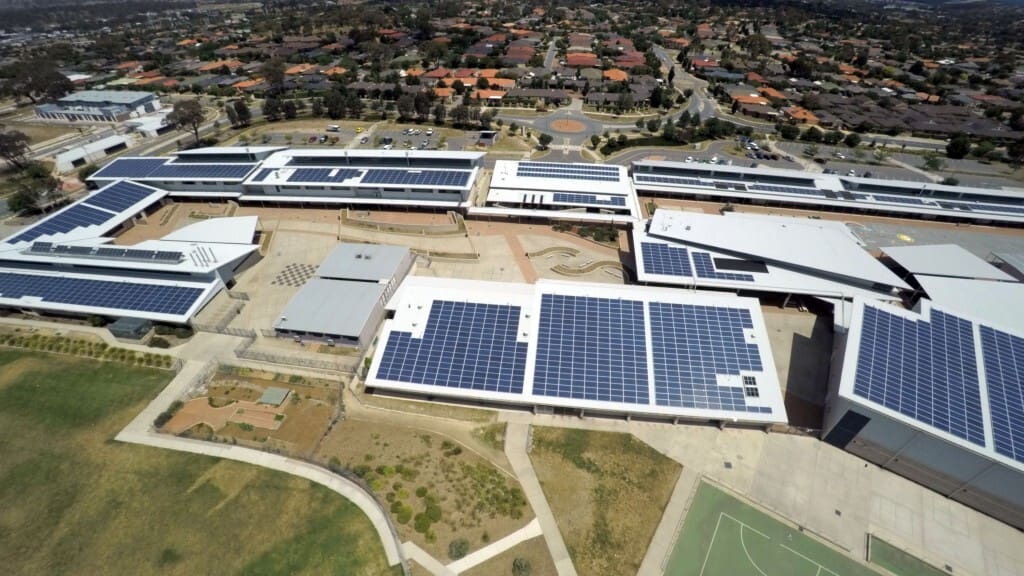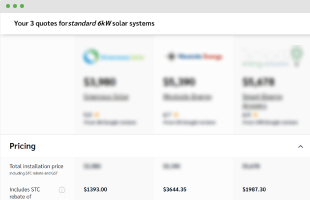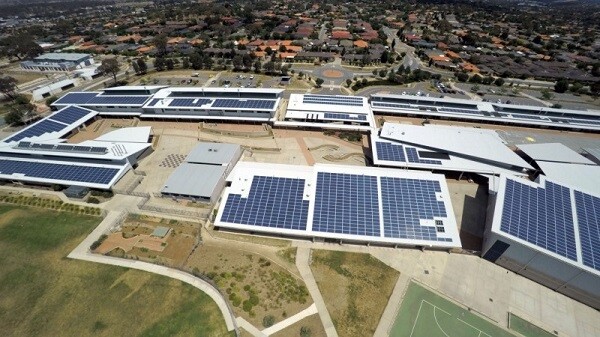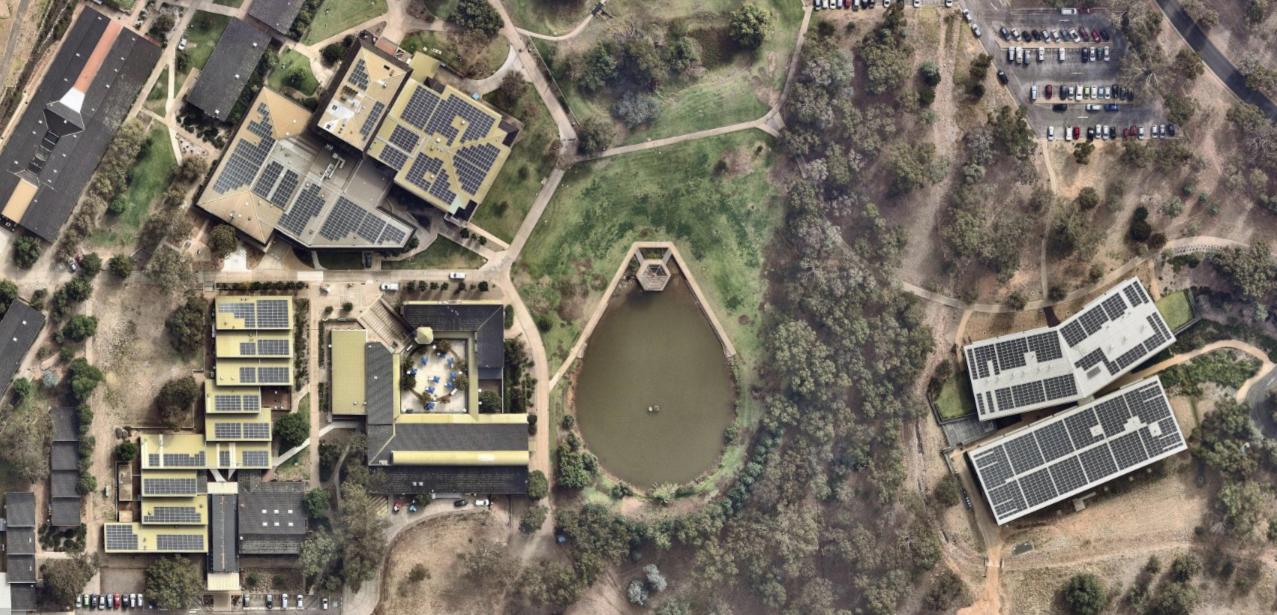A 500kW commercial solar system can be a great step towards achieving business sustainability goals often eliminating over 12,000 tonnes of CO2 emissions. There is usually a compelling financial case for these systems as the cost of energy can be less than 3c per kWh.
Pricing for 500kW Solar Systems
The cost of installing a solar system has fallen significantly in recent years thanks to a number of factors, including Australian government incentives for renewable energy, growing competition between solar panel installers and component manufacturers, and global manufacturing trends.
Solar Choice holds live pricing on Solar system sizes from 1kW to 10MW. To get an online quote comparison of Solar Choice accredited commercial installers for a 500kW solar system (or larger) please complete this form.
To give you an idea a 500kW system with good quality components can start as cheap as $600,000, but costs will increase for better quality solar products and if any additional costs are required to perform the installation.
There are some common factors that can influence the price of an installation:
- Generally ground-mounted arrays cost more than rooftop installations
- Long AC or DC cabling distances (>50m)
- Requirements to trench and backfill
- Concrete, tiled or partly shaded roofs
- Switchboard upgrades
To see average system prices for commercial system sizes up to 100kW see the Solar Choice Commercial Solar PV Price Index.
Solar Rebate for Large-Scale Solar Systems
The popular STC Rebate is applicable for residential and small business projects with a maximum system size of 99.9kW. Once you exceed 100kW the system is considered a ‘Power Station’ and is only eligible for a separate scheme that creates Large-Generation Certificates (LGCs).
These certificates are generated annually based on the quantity of renewable energy that is generated by the solar system. This creates an ongoing revenue stream compared to the STC program which provides an upfront rebate. Some installers in Solar Choice’s network will take ownership of the future revenue stream provided by LGCs and effectively convert the LGC income into an upfront deduction on the cost of the system.
Speak to an expert consultant on the solar potential of your commercial project
Amaroo School 600kW Solar System – photo of installation
(Project tender managed by Solar Choice Commercial.)
To see more photos of commercial installations managed by Solar Choice, visit our Tender Management page.
Energy yields for 500kW solar systems
There are many factors that influence the output of solar PV systems. These include the orientation and tilt angle of the solar panels, the presence or absence of shading, the average system operating temperature, and the quality of the system’s components. All of these factors are taken into consideration when a system is designed in order to arrive at a reasonable estimate as to what that system’s power output will be once it is operational.
| 500kW Solar System Output by Capital City | |
| Adelaide | 1,925 kWh per day |
| Brisbane | 2000 kWh per day |
| Canberra | 1925 kWh per day |
| Darwin | 2200 kWh per day |
| Hobart | 1550 kWh per day |
| Melbourne | 1675 kWh per day |
| Perth | 2100 kWh per day |
| Sydney | 1800 kWh per day |
A solar PV system produces more energy in summer than in winter:
A standard 500kw solar system in Sydney, NSW would produce about (3kWh x 500kW =) 1,500kwh on a winter’s day, while in the peak of summer the same 500kw solar PV system would produce around (5kWh x 500kw =) 2,500kwh. A similar system in Brisbane might produce as much as 1,750kWh in winter and 2,750kWh on a day in summer.
Rooftop Solar PV array for Charles Sturt University Wagga Wagga
(Read more about this project. Project tender managed by Solar Choice Commercial.)
Request a free solar business case and compare leading commercial installers
Financial returns for 500kW solar systems
The case for a 500kW solar system various on circumstances, but typically you are looking at a payback period between 4 and 7 years and an IRR up to 20% or above. Solar Choice’s engineers can use our model to develop a business case for your project at no cost. This is the starting point for any discussion on a solar project within a business.
The 5 biggest factors that influence Commercial Solar ROI are:
- Energy consumption matching daylight hours
- Roof structure and material
- Getting a competitive price via a solar tender
- Roof Slope and Azimuth
- Existing rates negotiated with the electricity retailer
Commercial Solar System Finance Options
It can be tough to secure funding for larger solar projects and often a financing agreement where the savings cover the repayments creates the path of least resistance through a board room. The 3 most commonly used commercial solar financing options are detailed in the below table.
| Type | Description | Typical Terms |
| Chattel Mortgage |
|
3% to 6%2 to 10 years |
| Rent to Own (lease) |
|
3% to 6%2 to 10 years |
| Power Purchase Agreement |
|
8c per kWh to 15c per kWh7 to 30 years |
Read our balanced assessment of the pros and cons of each financing method and a detailed example.
Run a Solar Tender for your large-scale Commercial Solar Project
The best way to get a high-quality solution and attract innovation from Australia’s leading commercial installers is by running a Solar Tender. Solar Choice has managed tenders across many of Australia’s largest Solar PV installations enabling clients to attract ALL major commercial installers in Australia to put together their best proposals.
Solar Choice via their free tender management platform helps design the optimal solar solution, invites the best-fit accredited installers to participate, prepares an apples-for-apples comparison across multiple proposals and provides independent expert advice on products, system design, warranties and financing options.
Compare Prices and installer options for 250kW & 1MW
- Apricus Heat Pumps: An Independent Review by Solar Choice - 11 April, 2024
- Reclaim Energy Heat Pump: Independent Review by Solar Choice - 11 April, 2024
- Solar Panels Brisbane: Compare installers & prices - 9 April, 2024





